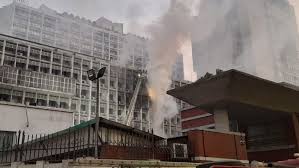
Md Nahid Islam, adviser to the Ministry of Posts, Telecommunications, and Information Technology, today said strict measures would be taken against those violating service rules under the guise of protests.
“We have observed some bureaucrats issuing threats. Their audacity stems from the previous regime, where bureaucracy was weaponised to establish fascism. Those violating service rules will face consequences,” Nahid said in response to a question regarding recent protests by bureaucrats and the fire at the secretariat.
The adviser urged bureaucrats to focus on serving the public and facilitating a democratic transition, stressing, “Lives were not sacrificed for protests that protect narrow interests.”
He made these comments during a dialogue titled “Unity, Reform, and Elections,” organised by the Forum for Bangladesh Studies at the Krishibid Institute in Dhaka’s Khamarbari today. Syed Abdullah moderated the second session of the dialogue.
In response to a question on visible actions against such bureaucrats, Nahid said, “Discussions have already taken place. Those violating regulations will be dealt with next week. Bureaucrats hiding from accountability have been identified, and swift action will be taken against them.”
He added, “Reforms are aimed at ensuring justice for all, including the bureaucrats themselves. Their opinions will be considered, but their recent reactions to reform proposals lack moral and legal justification.”
Nahid highlighted the interim government’s transitional nature, noting, “It is neither a constitutional nor a revolutionary government but operates through a unity process. That is why we have prioritised reforms, which political parties have demanded for 15 years.”
Adviser to the Interim Government, Mahfuz Alam said, “I am participating in dialogues between political parties and the chief adviser. If we receive reform proposals from the commissions, we plan to hold larger consultations with political parties and stakeholders between January and February. No unilateral decisions will be made on behalf of the government.”
He added, “Without establishing state institutions, unity is meaningless. The state’s foundation lies in its institutions, but the 1972 constitution destroyed the possibility of building such institutions in Bangladesh. Reforming and transforming state institutions into those serving the people is crucial; merely changing the government will not suffice.”
Nagorik Oikya President Mahmudur Rahman Manna, said, “Now is not the time for ‘B’ to replace ‘A’ and establish its authority. With ‘A’ gone, we must use advanced knowledge and collective public opinion to foster a new culture for the party and the country.”
“The common people gave their lives, and their struggle birthed the slogan, ‘We want a new Bangladesh.’ This means an end to disappearances, murders, looting, rape, and oppressive regimes. Instead, we will establish something truly excellent.”
Former state minister ANM Ehsanul Haque Milon, during his speech, stressed the need for an education commission, stating, “If Bangladesh aims to be a developed nation, a permanent education commission must be established.”
He criticised the previous government for destroying the education system.
BNP Adviser Mahdi Amin advocated reforms to create a stable environment for free and fair elections. He referenced BNP’s longstanding proposals, including a bicameral parliament and term limits for the prime minister.
“Our main goal is youth employment,” he said, adding that unemployed graduates would receive allowances under a BNP government.
Jamaat-e-Islami’s Assistant Secretary Hamidur Rahman Azad called for sustained anti-fascist unity.
“The July uprising has awakened new aspirations. We must seize this opportunity to build a nation free from discrimination and uphold democracy and voting rights,” he said.
Mojibur Rahman Manju of the AB Party highlighted the role of youth in driving change, saying, “Students have shaped this 15-year struggle. The future of Bangladesh depends on their leadership.”
Private University Students Alliance representative Tanjil Mahmud demanded national opportunities for private university students, noting, “Forty-eight private university students sacrificed their lives in the movement, and around 2,000 were injured.”
Indigenous leader Iliya Dewan criticised the Awami League for failing to protect minorities, despite claiming to uphold the Liberation War’s spirit. “Their actions do not match their words. Through this revolution, we aim to build a state free of discrimination,” she said.
Advocate Dilruba Sharmin quoted a professor’s remarks on Sheikh Hasina’s downfall, while Dr Roksana Khandaker stressed unity among political parties to prevent vote-buying and corruption.
Student leaders also weighed in. Bangladesh Islami Chhatra Shibir President Manjurul Islam called for annual student union elections, while Rashed Ahmed of Gono Odhikar Parishad criticised the government’s lack of a clear election roadmap.
Nasir Uddin Nasir, secretary of Bangladesh Chhatra Dal, highlighted the independence of student organisations, stating, “We expelled 300 members in the last few months to uphold our values.”
The dialogue reflected a broad consensus on the need for reforms while showcasing diverse viewpoints on the country’s democratic transition.
tbs

